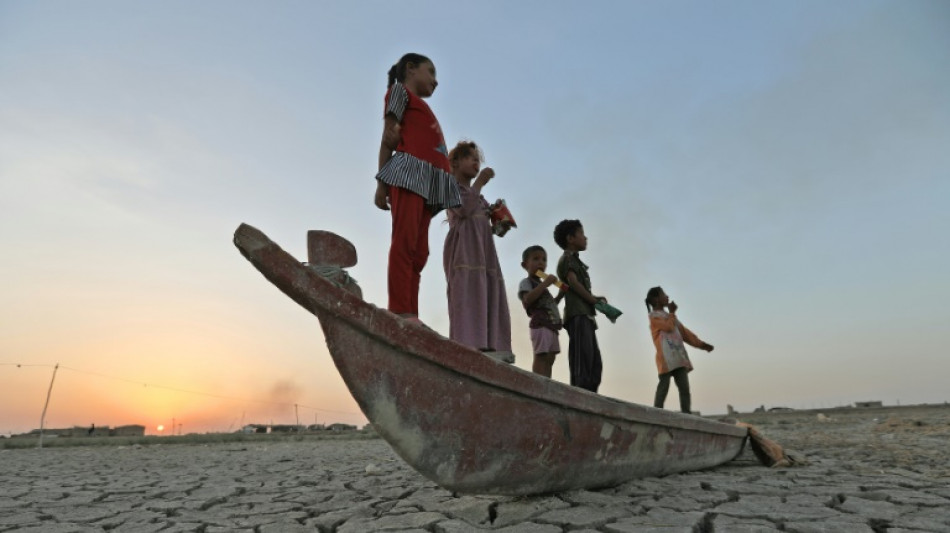
-
 International crew arrives at space station
International crew arrives at space station
-
Australia celebrate best-ever Winter Olympics after Anthony wins dual moguls

-
 Townsend becomes a fan again as Scotland stun England in Six Nations
Townsend becomes a fan again as Scotland stun England in Six Nations
-
France's Macron urges calm after right-wing youth fatally beaten

-
 China's freeski star Gu recovers from crash to reach Olympic big air final
China's freeski star Gu recovers from crash to reach Olympic big air final
-
Charli XCX 'honoured' to be at 'political' Berlin Film Festival

-
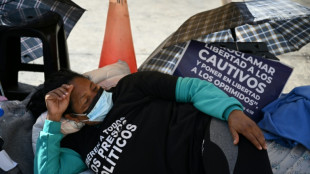 Relatives of Venezuela political prisoners begin hunger strike
Relatives of Venezuela political prisoners begin hunger strike
-
Trump's 'desire' to own Greenland persists: Danish PM

-
 European debate over nuclear weapons gains pace
European debate over nuclear weapons gains pace
-
Newcastle oust 10-man Villa from FA Cup, Man City beat Beckham's Salford

-
 Auger-Aliassime swats aside Bublik to power into Rotterdam final
Auger-Aliassime swats aside Bublik to power into Rotterdam final
-
French prosecutors announce special team for Epstein files
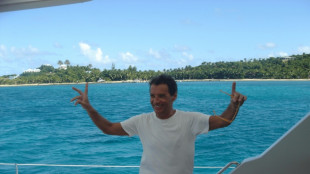
-
 Tuipulotu 'beyond proud' as Scotland stun England
Tuipulotu 'beyond proud' as Scotland stun England
-
Jones strikes twice as Scotland end England's unbeaten run in style

-
 American Stolz wins second Olympic gold in speed skating
American Stolz wins second Olympic gold in speed skating
-
Marseille start life after De Zerbi with Strasbourg draw

-
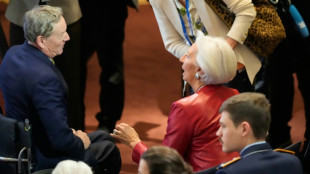 ECB to extend euro backstop to boost currency's global role
ECB to extend euro backstop to boost currency's global role
-
Canada warned after 'F-bomb' Olympics curling exchange with Sweden

-
 Ultra-wealthy behaving badly in surreal Berlin premiere
Ultra-wealthy behaving badly in surreal Berlin premiere
-
250,000 at rally in Germany demand 'game over' for Iran's leaders
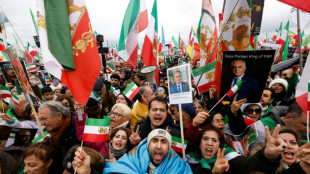
-
 UK to deploy aircraft carrier group to Arctic this year: PM
UK to deploy aircraft carrier group to Arctic this year: PM
-
Zelensky labels Putin a 'slave to war'
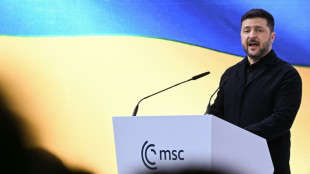
-
 Resurgent Muchova beats Mboko in Qatar final to end title drought
Resurgent Muchova beats Mboko in Qatar final to end title drought
-
Russia's Navalny poisoned with dart frog toxin: European states

-
 Farrell hails Ireland's 'unbelievable character' in edgy Six Nations win
Farrell hails Ireland's 'unbelievable character' in edgy Six Nations win
-
Markram, Jansen lead South Africa to brink of T20 Super Eights

-
 Guehi scores first Man City goal to kill off Salford, Burnley stunned in FA Cup
Guehi scores first Man City goal to kill off Salford, Burnley stunned in FA Cup
-
Swiss say Oman to host US-Iran talks in Geneva next week
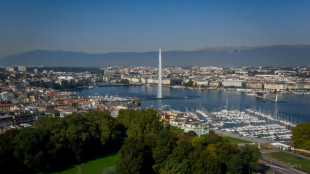
-
 Kane brace helps Bayern widen gap atop Bundesliga
Kane brace helps Bayern widen gap atop Bundesliga
-
Ireland hold their nerve to beat gallant Italy in Six Nations thriller

-
 European states say Navalny poisoned with dart frog toxin in Russian prison
European states say Navalny poisoned with dart frog toxin in Russian prison
-
Braathen hails 'drastic' changes after Olympic gold

-
 De Minaur eases past inconsistent Humbert into Rotterdam final
De Minaur eases past inconsistent Humbert into Rotterdam final
-
Eurovision 70th anniversary live tour postponed

-
 Cuba cancels cigar festival amid economic crisis
Cuba cancels cigar festival amid economic crisis
-
Son of Iran's last shah urges US action as supporters rally in Munich
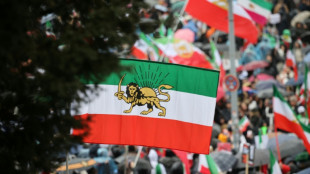
-
 Jansen helps South Africa limit New Zealand to 175-7
Jansen helps South Africa limit New Zealand to 175-7
-
Braathen wins unique Winter Olympic gold for Brazil, Malinin seeks answers

-
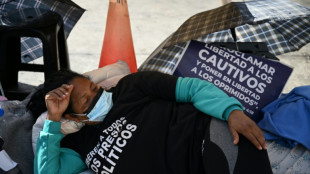 Relatives of Venezuela political prisoners begin hunger strike after 17 freed
Relatives of Venezuela political prisoners begin hunger strike after 17 freed
-
Ten-man West Ham survive Burton battle to reach FA Cup fifth round

-
 International crew set to dock at space station
International crew set to dock at space station
-
Suryakumar says India v Pakistan 'not just another game'

-
 Brook hails 'brilliant' Banton as England back on track at T20 World Cup
Brook hails 'brilliant' Banton as England back on track at T20 World Cup
-
Brazilian Olympic champion Braathen is his own man - and Norway's loss

-
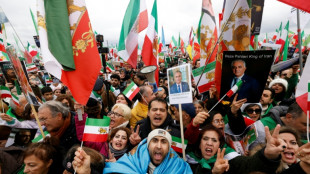 About 200,000 join Iran demonstration in Munich: police
About 200,000 join Iran demonstration in Munich: police
-
Where did it all go wrong for 'Quad God' Malinin?

-
 Brazil's Braathen wins South America's first ever Winter Olympic gold
Brazil's Braathen wins South America's first ever Winter Olympic gold
-
Banton powers England to victory over Scotland at T20 World Cup

-
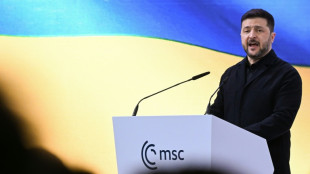 Zelensky says all Ukrainian power plants damaged, calls Putin 'slave to war'
Zelensky says all Ukrainian power plants damaged, calls Putin 'slave to war'
-
Palestinian leader urges removal of all Israeli 'obstacles' on Gaza ceasefire


Iraq's Garden of Eden now 'like a desert'
To feed and cool his buffaloes, Hashem Gassed must cross 10 kilometres (six miles) of sunburnt land in southern Iraq, where drought is devastating swathes of the mythical Mesopotamian Marshes.
The reputed home of the biblical Garden of Eden, Iraq's swamplands have been battered by three years of drought and low rainfall, as well as reduced water flows along rivers and tributaries originating in neighbouring Turkey and Iran.
Vast expanses of the once lush Huwaizah Marshes, straddling the border with Iran, have been baked dry, their vegetation yellowing. Stretches of the Chibayish Marshes, which are popular with tourists, are suffering the same fate.
"The marshes are our livelihood -- we used to fish here and our livestock could graze and drink," said Gassed, 35, from a hamlet near Huwaizah.
Southern Iraq's marshlands were inscribed as a UNESCO World Heritage site in 2016, both for their biodiversity and their ancient history.
But now, beds of dry streams snake around the once verdant wetlands, and the area's Um al-Naaj lake has been reduced to puddles of muddy water among largely dry ground.
Like his father before him, Gassed raises buffaloes, but only five of the family's around 30 animals are left.
The others died or were sold as the family struggles to make ends meet.
Family members watch carefully over those that remain, fearful that the weak, underfed beasts might fall in the mud and die.
"We have been protesting for more than two years and no one is listening," Gassed said.
"We are at a loss where to go. Our lives are over."
- 'No more fish' -
Nestled between the Tigris and Euphrates rivers, the Mesopotamian Marshes suffered under the former dictator Saddam Hussein, who ordered that they be drained in 1991 as punishment for communities protecting insurgents, and to hunt them down.
The wetlands have sporadically gone through years of harsh drought in the past, before being revived by good rainy seasons.
But between August 2020 and this month, 46 percent of the swamplands of southern Iraq, including Huwaizah and Chibayish, suffered total surface water loss, according to Dutch peace-building organisation PAX.
Another 41 percent of marsh areas suffered from reduced water levels and wetness, according to the organisation, which used satellite data to make the assessment.
The UN's Food and Agriculture Organization in Iraq said the marshes were "one of the poorest regions in Iraq and one of the most affected by the climate change", warning of "unprecedented low water levels".
It noted the "disastrous impact" on more than 6,000 families who "are losing their buffaloes, their unique living asset".
Biodiversity is also at risk.
The swamplands provide a home for "numerous populations of threatened species", and are an important stopping point for around 200 species of migratory water birds, according to UNESCO.
Environmental activist Ahmed Saleh Neema said there were "no more fish", wild boar or even a subspecies of smooth-coated otter in the marshes.
- 'Like a desert' -
He said the Huwaizah swamplands were irrigated by two tributaries of the Tigris River, which originates in Turkey, but that their flows had dropped.
Iraqi authorities are rationing supplies to cover different needs, he said.
"The government wants to preserve the largest quantity of water possible," he added, lamenting "unfair water sharing" and "poor (resource) management".
After pressure from protesters, authorities partially opened the valves, he said, but had closed them again.
On the Iranian side, the Huwaizah Marshes, called Hoor al-Azim, are also suffering.
"The wetland is facing water stress and currently about half of its Iranian part has dried up," Iran's state news agency IRNA reported recently.
Hatem Hamid, who heads the Iraqi government's water management centre, said that "on the Iranian side, the main river that feeds the Huwaizah marsh has been totally cut for more than a year".
The water needs of Iraqi farms and marshlands are only half met, he acknowledged, as authorities are closely monitoring reserves and trying to cover a range of uses, with drinking water one of the "priorities".
Iraqi officials point to canals and small streams that have been rehabilitated to feed into the marshes -- and to where some families have relocated from dried-out areas.
But it is "impossible to compensate for the very high evaporation in the marshes" in temperatures that pass 50 degrees Celsius (122 degrees Fahrenheit), he added.
In Chibayish, the effects of the drought are all too clear to Ali Jawad, who said dozens of families had left his hamlet.
"They migrated towards other regions, looking for areas where there is water," the 20-year-old said.
"Before, when we used to come to the marshes, there was greenery, water, inner peace," he added.
"Now it's like a desert."
Q.Najjar--SF-PST

